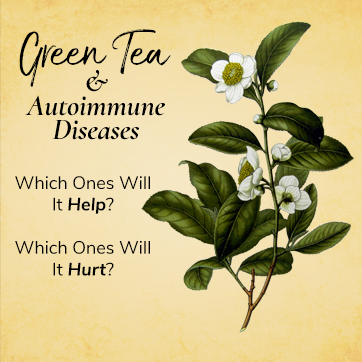Disclaimer: I am not a medical professional. Do not ingest or otherwise use a herb or oil based on this information. Always do your own research, and speak with a medical professional about the supplements that you are taking. Wild Hemlock takes no responsibility of how you use this information. Herbs on this website may not be approved by the FDA nor may be on the Generally Regarded as Safe list of herbs maintained by the FDA. This information has not been evaluated by the FDA. This information is not intended to diagnose, treat, cure, or prevent any disease.

Often we hear that green tea is a wonder drug: it prevent cancer, it prevents dementia, it prevents degenerative diseases, it clears your skin, it wins you the lottery… almost. Green tea, and its popular component EGCG, have been shown to actively treat some autoimmune disorders in humans. In others, though, it can worsen the immune system’s attack against you!
Green Tea is a processed leaf product from the Camellia sinensis plant. It is traditionally brewed with hot water and drunk as a tisane, but it can also be used on your face, concentrated into a supplement, or infused into baked goods. It is beautiful to behold, and its ornamental Camellia cousins bloom in gardens across the US. Scientists are actively studying this plant, and discover more about it every day.
For certain autoimmune conditions, Green Tea may help mediate symptoms. Green tea may also harm those who suffer from other autoimmune disorders.
Green tea is called green due to the color it retains during processing. Unlike black teas, which are oxidized and become a brown color not unlike bananas, green tea is heated to prevent its enzymes from reacting with oxygen. The leaves are then twisted so as to retain their natural essential oil, polyphenol, and caffeine content. Its resulting tisane is generally yellowish to green, adding to its verdant reputation [4].
Green Tea’s constituent ECGC, or (-)-epigallocatechin-3-gallate, is believed to be the primary driver behind its effect on the immune system. It is believed that ECGC affects two types of immune system cells which are associated with autoimmune disorders: the TNF-α and the CD4(+) T cells. Over activity from these cells are related to a number of different autoimmune disorders [2]. Green tea, in mice, has demonstrated the ability to inhibit the proliferation (or slow down the creation of new cells) of the CD4(+), TNF-α, and IL-6 immune system cells [2]. In human studies, green tea supplementation has exhibited decreased TNF-α activity and symptom severity, specifically for those who suffer from Sjögren’s Syndrome [1].
What does that mean in plain English?
-
 Green Tea Botanical Illustration & Chemistry Poster$14.90 – $18.90
Green Tea Botanical Illustration & Chemistry Poster$14.90 – $18.90 -
 Chamomile Tea Botanical Illustration & Chemistry Poster$14.90 – $18.90
Chamomile Tea Botanical Illustration & Chemistry Poster$14.90 – $18.90 -
 Green Tea Botanical Chemistry Poster [DOWNLOAD]$5.99
Green Tea Botanical Chemistry Poster [DOWNLOAD]$5.99
For certain autoimmune conditions, ECGC may help mediate symptoms. Those specifically listed in literature include Sjögren’s Syndrome [1], autoimmune encephalomyelitis, and multiple sclerosis [2].
It is possible, though, to extrapolate that it may also help other conditions similar to these, “Th1 Dominant” autoimmune disorders. These disorders are affected by the T cells listed above. Green tea may also harm those who suffer from “Th2 Dominant” autoimmune disorders. Those disorders may be partially regulated by the T cells previously discussed [3].
Autoimmune Disorders Green Tea May Help [3]
- Sjögren’s Syndrome [1]
- Autoimmune Encephalomyelitis [2]
- Multiple Sclerosis [2] [3]
- Type 1 Diabetes [3]
- Psoriasis, and Psoriatic Arthritis [3]
- Rheumatoid Arthritis [3]
- Hashimoto’s Disease, and Grave’s Disease (Thyroiditis) [3]
Autoimmune Disorders Green Tea May Harm [3]
- Allergies [3]
- Asthma [3]
- Chronic Sinusitis [3]
- Cancers, many kinds [3]
- Hepatitis B and C [3]
- Ulcerative Colitis [3]
- Systemic Lupus Erythematosus [3]
Always speak to your doctor and discuss this and any supplement you may consider taking. It may be too hard on your heart, it may also cause your prescription medications to be less effective. There are many other interactions which must be considered – so talk to your doctor first!
Do you like WildHemlock.Com?
Support with Paypal!
Sources:
- Medical College of Georgia. “Green Tea And EGCG May Help Prevent Autoimmune Diseases.” ScienceDaily. ScienceDaily, 20 April 2007. <https://www.sciencedaily.com/releases/2007/04/070419140910.htm>
- Wu, Dayong et al. “Green tea EGCG, T cells, and T cell-mediated autoimmune diseases.” Molecular aspects of medicine vol. 33,1 (2012): 107-18. doi:10.1016/j.mam.2011.10.001 <https://pubmed.ncbi.nlm.nih.gov/22020144/>
- Walsh, Bryan. “Green Tea Health Risks: Could Green Tea Actually Be Bad for You?” Precision Nutrition, 18 Sept. 2019, <https://www.precisionnutrition.com/rr-green-tea-hazards>
- TeaClass, Adagio Teas, <https://www.teaclass.com>

